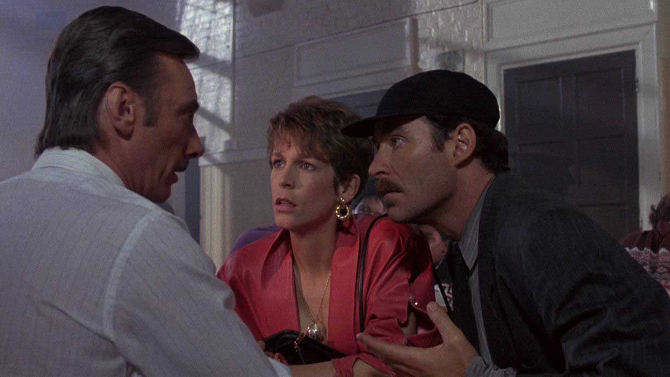Satirizing the stereotypical nature of Brits and Americans, John Cleese’s 1988 film A Fish Called Wanda, directed by Charles Crichton, is a kooky heist movie with loads of quirky humour.
Following a gang of bank robbers, the group consists of a comic version of a femme fatale, Wanda (Jamie Lee Curtis), her secret lover pretending to be her brother, Otto (Kevin Kline), as well as an English duo, Georges Thomason (Tom Georgeson) and the severely stuttering Ken Pile (Michael Palin – he based the part on his father, who dealt with a similar issue). To further complicate things, Wanda is sleeping with Georges and is prone to flirting with Ken.
Filled with doublecrosses and complications, Georges soon finds himself in jail – not knowing who put him behind bars. With only one quasi-witness, an elderly lady who spotted the man while they were driving away from the scene of the crime, the prisoner turns to his longtime compatriot Ken to finish the woman off in a way that will look accidental – knowing that without her, the case falls flat.
Thankfully for Georges, he was smart enough to hide the diamonds before he was arrested, leaving Wanda and Otto scrambling to discover where the jewels are. The sultry, seductive Wanda turns to a grandiloquent barrister, Archie Leach (John Cleese), the attorney for Georges, hoping to pull the needed information from him. For those of you who may find themselves thinking the moniker Archie Leach sounds familiar, that is because it is Cary Grant’s real name.
Otto – a cocky, confident, arrogant and over-the-top energetic man, believes he is a brilliant individual, but is actually rather dim-witted. To exemplify some of his outlandish and horribly misconstrued theories, I reference a quote in which Wanda puts the man in his place – “now let me correct you on a couple of things, OK! Aristotle was not Belgian. The central message of Buddhism is not ‘Every man for himself’. And the London Underground is not a political movement”. Having nothing to do with his time, he pursues Wanda with a watchful eye, trying to keep her from falling into the arms of yet another man.
As the plot thickens, Wanda starts to have some feelings for the tall, magisterial lawyer who has fallen head over heels in love with the seemingly impetuous dame. One particularly memorable scene finds Wanda (who was getting frisky with Archie) and Otto (who was spying on them) having to dodge Archie’s wife and daughter as they have returned home unexpectedly from the opera. It is a masterclass in cleverness, stupidity, spot on reactions, as well as having a realistic sense of spontaneity. What will come of their phony relationship? Will stammering Ken be able to help his friend out of his dire situation? Who will find the diamonds? Will anyone get away with the crazy caper?
Filled with entertaining performances, Cleese, who co-wrote the story, is a picture-perfect example of the stereotypical posh British upper statesman. Cool, pompous and stoic, his traditional British home life (in which he and his wife sleep in separate beds – like Fred and Wilma in The Flintstones, or perhaps more accurately, Basil and Sybil Fawlty in the Cleese created television series Fawlty Towers) is a prototypical vision of what many imagine those in England to be like. A nice touch is how the archetypal figure warms as he becomes embroiled in the fake love affair with the very American Wanda. On the other side of the Atlantic, Kline takes on the role of the stereotypical American – a loud-mouthed, crude, gun-loving individual who believes he is smarter than he actually is. Perhaps best exemplifying the culture clash is this small section of dialogue between Kline’s Otto and Cleese’s Archie:
Otto – “You pompous, stuck-up, snot-nosed, English, giant, twerp, scumbag, f**k-face, dickhead, asshole.
Archie – “How very interesting. You’re a true vulgarian, aren’t you?
Otto – “You are the vulgarian, you f**k.”
Playing off of each other, great chemistry is built amongst the entire cast – funnily enough, Cleese and Palin, two Monty Python icons, spend less time onscreen together than nearly everyone else. To return once again to Kline, it was his over the top, caricatured persona that he concocted which earned him the Best Supporting Actor Oscar at the Academy Awards.
To turn to Palin, his take on the stuttering Ken Pile is highly entertaining. An animal lover, he takes offense to any action against even the smallest of creatures. In his apartment, he has a tank full of fish, including a special one that he calls Wanda. A clever twist finds him attempting to take out the elderly, dog loving woman, each time missing in a more than comic way, killing one of her beloved pets instead – leaving the skill-less hit-man distraught. It is a very British/Irish/Scottish thing, finding comedy or drama in the death of a dog. Think Keeping Mum, Perrier’s Bounty, as well as Calvary, the first two are reviewed here on Filmizon.com.
A fun foray into a crime-filled comedy, A Fish Called Wanda is an all around solid motion picture. Influential in the realm of comedy, there is one scene that revolves around a cement roller that will likely remind some of a sequence from Austin Powers: International Man of Mystery, while a moment that finds Palin and Cleese riding on a motorbike could bring to mind the mode of transportation used in Dumb and Dumber – these are just two examples among many. It also features a small cameo from a youthful Stephen Fry. You won’t need to put on a stiff upper lip to watch this classic comedy, you’ll be able to swallow this funny fish whole.

